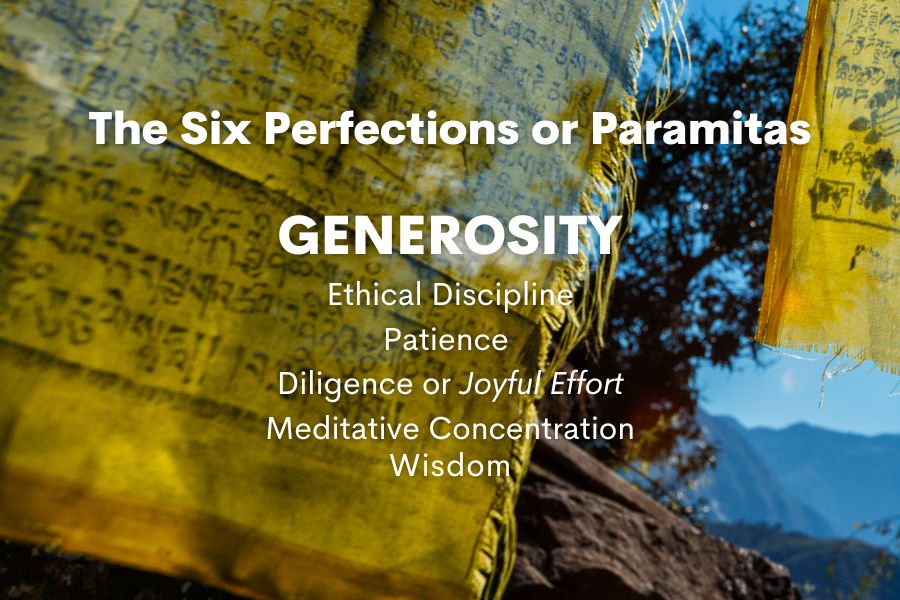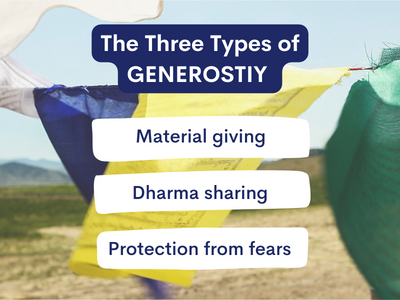Welcome to our series on the Six Perfections or Six Paramitas of Buddhism!
The Six Perfectioins are:

Most likely, all of us have some experience with attachment, right? It’s one of those pesky Three Poisons that usually manifests as selfishness, greed, and clinging to our own preferences. We’ve all been there and will probably be there again. Sigh. So, how do we work with that? Good news! We are here to tell you that there is a solution! We find it through the practice of generosity, one of the Six Perfections or Six Paramitas, which serve as guides to enlightenment.
In the Mahayana and Vajrayana paths of Buddhisim, we focus our motivation on relieving suffering and improving the welfare of others. Our own spiritual progress is greatly enhanced by the power of that motivation of love and compassion … and following through with action. Let’s focus on expanding that love and compassion through acts of generosity!

What is Generosity?
Generosity is the mental state of offering something to which we are attached. The mind is the primary emphasis, rather than the act of giving. We are developing the “mind of giving” which serves as the antidote to our attachments. It’s easy to give away things that we don’t want, right? When was the last time you gave away something to which you were attached? How was that experience for you?
There are three subcategories of generosity:
- Material giving. You guessed it, the giving of physical possessions.
- Dharma sharing. Also not surprising, this helps people’s minds, therefore their whole experience, karma, etc.
- Protection from fears, the most virtuous example of which is saving a life.
To further demonstrate the meaning of generosity, here is a fable from Lama Tsomo’s book, Deepening Wisdom, Deepening Connection.
“One king was downright pitiful in the generosity department. When the teacher he was studying with told him of the importance of practicing generosity, he cried, “But I have no capacity for that at all! How can I practice it?” The teacher was very wise and knew what we’ve been talking about here: that if we force ourselves to practice in a way far beyond our capacity, we’ll snap back like a rubber band to our old ways of acting.
Too much generosity and we resent it, which ruins the karmic benefit and will probably be followed by a snapping back to selfish behavior. If we don’t challenge ourselves some, though, we won’t make any progress.
So the teacher asked the king to pick up a nearby orange. “Do you have enough generosity that you can give that orange to your left hand?” “Yes!” cried the delighted king. He actually hesitated. Even giving to his own left hand was a bit of a stretch. “Good,” intoned the teacher. “Begin with doing that back and forth until you’re completely comfortable with it, and expand from there.”
The king enthusiastically practiced this many times until he was ready to stretch a bit more. The teacher gave him slightly bigger and bigger challenges to his generosity, which he also enthusiastically practiced many times a day. After a time, the king gave vast amounts of his wealth and possessions to his subjects. His kingdom flourished and he became known for his generosity.”
From Ancient Wisdom for Our Times: Tibetan Buddhist Practice: Deepening Wisdom, Deepening Connection, Namchak Publishing Company LLC p 88.
How can we apply Generosity to our actions?
As we contemplate and define how we can help ease the suffering of others and bring happiness, we can use these questions to zero in on what we desire to and are able to do:
What is a cause I care about?
What do I see as a strategic way to move the needle?
Identify a person or group of people I care about that’s moving that needle.
And most importantly…
What am I going to do about it? What might be my entry point?
If you’re looking for ideas and inspiration, check out our Engaged Bodhicitta page!
Like the King Lama Tsomo mentioned above, we can start small and give away that which feels fairly easy to give. Then work up towards giving away whatever holds strong attachments in our lives. Remember, this is a lifelong goal. You could start by volunteering for an organization that is doing good in the world.
Generosity doesn’t have to be the giving of material goods. One could give time by volunteering. Before we donate our time, efforts, or money to a person or a cause, we should first check in with our intention. True generosity is to give without the expectation of reciprocity or recognition. It begins with the altruistic intention of benefiting others.
When we start there, our generosity is sure to make a positive impact for whoever receives it.
Let us know how you’re practicing generosity!
Discuss generosity and the remaining Six Perfection with others by joining a Learning Circle or an Upcoming Event!
